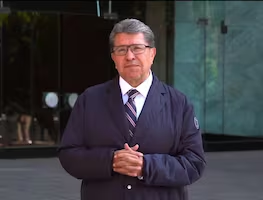Más Información

Inicia pago de la Pensión del Bienestar del bimestre enero-febrero; estas son las fechas de depósito

Violencia en el país evidencía colapso de estrategia de seguridad: PRI; insiste en cambiar el rumbo de combate

Defensa toma protesta al general Maximiliano Cruz Ramos; fungirá como Inspector y Contralor General de División de Estado Mayor

Sheinbaum destaca reducción de homicidios dolosos en último mes de 2024; “Confiamos en nuestra estrategia”, dice

Sheinbaum no hablará de seguridad en reunión con presidentes municipales; revisarán tema de infraestructura

Monreal reitera apoyo a Sheinbaum para este 2025; “la conducción del país está en buenas manos”, dice
Demonized by U.S. President Donald Trump and exhausted after a harrowing journey, members of Central American migrant caravans now face a new threat: open hostility from some Mexicans on the U.S. border .
A small group of residents of an upscale neighborhood in the Mexican border of Tijuana confronted caravan migrants late on Wednesday , throwing stones and telling them to go back to their home countries.
“Get out of here,” a group of around 20 people shouted at a camp of Hondurans near the border
. “We want you to return to your country. You are not welcome.”
Migrants shouted back, in a confrontation that belied Tijuana’s reputation as a free-wheeling, tolerant city and lasted into the early hours of Thursday . Dozens of police officers arrived at the scene.
A caravan of thousands of mostly Honduran migrants who are fleeing violence and poverty at home set off for the United States in mid-October , with the bulk of them still to arrive at the border. Other large bands of mostly Salvadorans have followed behind.
Trump has deemed the caravans an “ invasion ,” and has sent some 5,800 troops to “harden” the border and install barbed wire.
With some exceptions, Mexico has welcomed the Central Americans , offering food and lodging in towns during their journey. The migrants said they were stunned by the hostile attitude in Tijuana.
“We are not criminals. Why do treat us like this if everywhere we have traveled in Mexico they treated us well?”
migrants shouted back. “Think about the children who are here, please.”
Recent polls show a sizeable minority of Mexicans opposed to aiding the migrants as they head northward to the United States.
An Oct. 26-28 survey of 1,000 Mexicans by polling firm Consulta Mitofsky showed that 51.4 percent were in favor of helping or protecting the migrants , while 33.8 percent took the opposite view , believing that they should be pressured to return home. The remaining respondents expressed no opinion.
Tensions began brewing in Tijuana a few days ago when residents complained about a group of 80 or so LGBT migrants who broke away from the caravan and arrived in an upscale part of the Playas de Tijuana neighborhood, near where the stones were thrown.
A popular party town for U.S. tourists, Tijuana has a history of absorbing visitors, including Chinese immigrants in the 19th century . It has a large American population and some 3,000 Haitians settled in the city , just south of San Diego, in 2016 after failing to cross the U.S. border.
But the arrival of hundreds of members of the caravans has stretched to the limit migrant shelters that were already overflowing with people. While Tijuana’s traditional generosity was also on display, with the government setting up a new shelter and citizens offering food and clothing, a harder attitude also emerged.
Reuters
gained access to a WhatsApp chat group called “Citizen Blockade” where some 250 members using strong language discussed strategies to harass the migrants or block their arrival.
Tijuana’s city government opened a shelter for 360 people of an estimated 810 that arrived this week , and officials warned there was little room to house more than 2,000 more who are expected to arrive this week .
In an interview with EL UNIVERSAL , the city mayor, Juan Manuel Gastélum , assured that the state had not received support from the federal government. Although the local government has tried to work hand-in-hand with the outgoing administration “they have done nothing but talk.” He added that the city did not have enough resources to provide humanitarian support or even shelter for the Central Americans.
When asked about the arrival of the first caravan members, Gastélum claimed that it had been a complete disaster, since 78 people were taken to a hotel for medical assistance without notifying the local government . Furthermore, he said that the migrants had rejected spaces offered by the municipal government and were even seen upsetting locals, consuming alcoholic beverages, and smoking marijuana at the International Friendship Park .
Irineo Mujica, representative of the organization Pueblos Sin Fronteras
, which is advising the migrants in the caravan, said the migrants wanted to seek asylum in the United States.
Their arrival adds to the already long lines of people who have been waiting their turn at the Tijuana crossing. Last week, Trump suspended the granting of asylum to migrants who cross the U.S.-Mexico border illegally .
“We are looking for solutions, not confrontations,” Mujica said following the clash with Mexicans as a helicopter hovered above, surveying the scene from the American side.
It is worth noting that the Mexico City government has spent around MXN$12 million so far to receive migrants by putting up shelters and providing food for the Central Americans, though another 3,000 migrants are expected to arrive during the next few days .
Furthermore, the government of Sinaloa registered 26 cases of A1HN1 flu among the migrant caravan , after which authorities decided to implement health brigades to prevent more migrants from getting sick.
Meanwhile, in the state of Jalisco, authorities decided to shut down the shelter that had been put up at the Benito Juárez auditorium , arguing that around 100 of all 5,500 people that stayed there had ingested alcoholic beverages, engaged in sexual relationships, and caused fights.
dm




